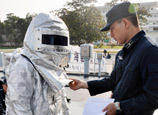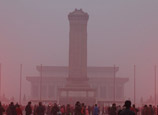
DHAKA, Jan. 28 (Xinhua) -- Bangladesh and India on Monday signed a key pact to exchange detainees between the two neighboring South Asian countries.
Bangladesh Home Minister Muhiuddin Khan Alamgir and his Indian counterpart Sushilkumar Shinde signed the agreements on behalf of their respective counties during a home ministerial meeting here Monday.
Both countries also signed a liberalized visa agreement, called Revised Travel Arrangement (RTA), which paves the way for removing restrictions on visits of businesspersons, students, patients, senior citizens above 65 years and children below 12 years.
After signing the pacts, Indian Home Minister Sushilkumar Shinde, who arrived in Dhaka Monday morning on a two-day visit, held bilateral talks with his Bangladesh counterpart Muhiuddin Khan Alamgir.
The cabinets of both countries had earlier approved the draft of the treaty on their respective parts.
According to sources, the extradition treaty has some refusal provisions under which extradition of someone can be refused by the country concerned if it poses a threat to national security.
Source said the extradition treaty will benefit India immensely as it will pave the way for the deportation of a number of insurgent leaders currently lodged in Bangladeshi jails, including Anup Chetia, general secretary of the United Liberation Front of Assam.
According to sources, New Delhi is now in a position to ask Dhaka for deportation and many other most wanted persons as the extradition pact paved the way for exchange of detainees.
Anup Chetia of ULFA, a northeast Indian separatist group seeking to establish a sovereign Assam, was arrested in Bangladesh in 1997 and sentenced to seven years in jail for illegal entry and possession of firearms.
Chetia is on the top of the Indian list, but sources said he could not be handed over to India till now due to the absence of any extradition treaty between the two countries.
Dhaka has also been keen to sign the extradition treaty as Prime Minister Sheikh Hasina's government is seeking India's help in nabbing and handing over two of the fugitive killers of Bangladesh's founding hero Sheikh Mujibur Rahman.
Rahman's two killers, Captain (retd) Abdul Mazed and Risalder Moslehuddin (retd), are believed to be hiding in India.
Bangladesh's Cabinet Secretary M Musharraf Hossain Bhuiyan told reporters that "no political detainee will be brought under the purview of the treaty."
Merely criminals who have been convicted and accused in a criminal case will be exchanged under the treaty, he said after the cabinet meeting chaired by Prime Minister Sheikh Hasina approved the proposal to sign the deal on Monday morning.
He said Bangladesh, which has a similar treaty with Thailand, can cancel the treaty anytime with a six-month notice.
Although Dhaka and Delhi cannot extradite criminals in the absence of a treaty, the two countries have been handing over criminals informally since Prime Minister Sheikh Hasina took office in January, 2009.
Dhaka and Delihi had earlier signed agreements on Mutual Legal Assistance on Criminal Matters, Transfer of Sentenced Persons and Combating International Terrorism, Organized Crime and Illicit Drug Trafficking during Prime Minister Sheikh Hasina's visit to New Delhi in January 2010.
















 Buildings collapse after subsidence in S China
Buildings collapse after subsidence in S China


![]()
